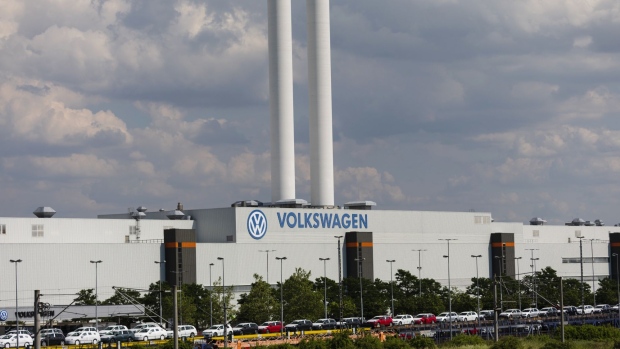Nov 4, 2019
Merkel Cheers on VW’s Electric Push as Climate Critique Grows
, Bloomberg News

(Bloomberg) -- Angela Merkel’s visit to a revamped Volkswagen AG electric-car plant in Zwickau on Monday is a stark reminder of what’s at stake both for the German chancellor and VW boss Herbert Diess.
Merkel -- who critics say has long been soft on the auto industry -- has come under fire for failing to make more progress in curbing greenhouse gas emissions, while Diess is attempting to manage the expensive shift to electric vehicles for the masses without ruining the world’s biggest carmaker.
Merkel’s visit to the factory in the eastern state of Saxony marks the production start of VW’s ID.3, the brand’s first mass-market vehicle based on a dedicated technology for purely battery-powered cars. Success is vital for the massive investment to pay off and safeguard jobs.
The chancellor’s foray into eastern Germany comes just days after her Christian Democrat party slumped to a disastrous result in an election in the neighboring state of Thuringia, stoking fresh doubts about the stability of her ruling coalition in Berlin. Voters have deserted her Christian Democrat-led bloc and her junior coalition partner, the Social Democrats, in droves amid gains for the far-right and environmentalist Greens.
For VW, the ID. 3 represents a first stage in its attempt to manage a transition away from the combustion engine without inflicting too much damage on its balance sheet, something no automaker has yet accomplished.
The Zwickau plant, which had been making Golfs and Passats, marks the traditional automaking industry’s first site being switched directly to all-electric cars from combustion-powered models.
“The production start of the ID.3 ushers in a new era for Volkswagen -- one comparable to the first Beetle or the first Golf,” Thomas Ulbrich, VW brand board member responsible for electric mobility, said in a statement. The factory is going “from 100% internal combustion engines to 100% electric drives.”
Rich Heritage
Construction work to convert the Zwickau factory into Europe’s largest plant exclusively making fully-electric vehicles is on track to finish in 2021, VW said. Upon completion, it will churn out as many as 330,000 cars per year, slightly less than Tesla Inc.’s targeted global deliveries for 2019.
It’s unclear, though, how many German customers will switch to electric cars in a country with a rich automotive heritage centered on combustion engines. Charging infrastructure in Europe’s largest economy remains patchy. Adoption has been tepid and forced Merkel to push back a target of 1 million electric cars on German roads by two years to 2022.
VW has earmarked about 30 billion euros ($33 billion) to develop the industry’s largest fleet of electric cars, more than any other company. Zwickau is leading the push with plans to produce six different models for the group’s VW, Audi and Seat brands. The company will have a total of eight factories worldwide by 2022 that make electric vehicles.
Top officials from German automakers, parts suppliers and labor unions are due to meet Merkel and key regional leaders in Berlin on Monday evening for their latest discussion about electric mobility, including plans to boost charging infrastructure.
Merkel said in a podcast Sunday previewing the meeting that the government’s focus is on promoting electric vehicles but that it’s also open to hydrogen technology. It wants 1 million charging stations to be in place by 2030, she said.
Encouraging consumers to buy electric cars via a so-called “Environment Bonus” funded by the government and automakers is one option under consideration, Merkel added.
To contact the reporter on this story: Christoph Rauwald in Frankfurt at crauwald@bloomberg.net
To contact the editors responsible for this story: Chad Thomas at cthomas16@bloomberg.net, Iain Rogers, Anthony Palazzo
©2019 Bloomberg L.P.






